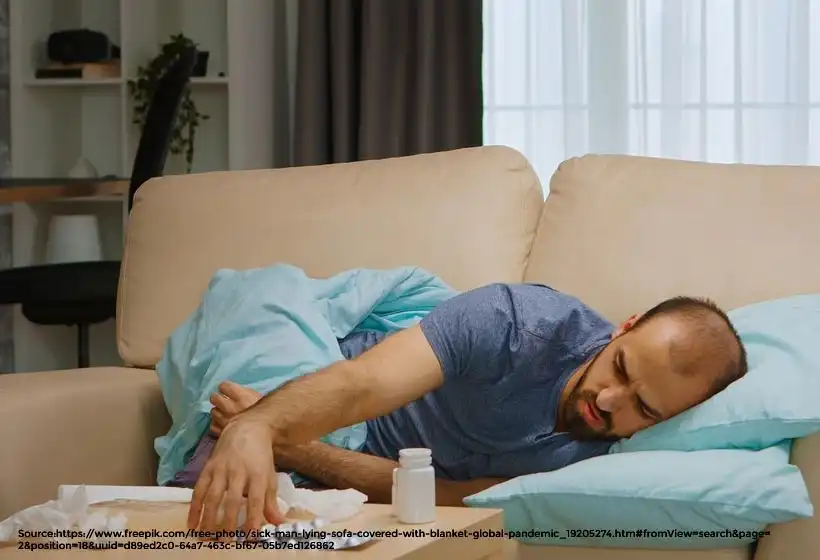What is the Best Medication for Narcolepsy?

Is narcolepsy something you have been struggling with? It is a condition that’s often misunderstood.
Just like you, I want to find a way to control the symptoms. I have done a lot of research and spoken with healthcare professionals. I have found what works best for narcolepsy. Today, I will talk about the best medicine so that you can control your condition.
I will share what I have learned and how the medicine will help you.
To know more, keep reading!
What is Narcolepsy?
Narcolepsy is a sleep disorder. It makes people want to fall asleep at odd times during the day. You may find it hard to avoid. Narcolepsy can usually be treated. However, it can still make it hard to live your life.
Narcolepsy has a lot of symptoms. It includes:
- Too much sleepiness during the day: Everyone who has narcolepsy has this condition. If you have narcolepsy and study the disorder, you may call these episodes “sleep attacks.”
- Cataplexy or sudden muscle weakness: This might only have minor effects. It includes making one side of your body hurt. It makes your muscles weak.
- Sleep Paralysis: You might wake up fully sometimes, but not always. You won’t be able to move when you have this condition.
Whatever problems you’re facing with narcolepsy, there are ways to make your life better. There is one medicine called sodium oxybate. It is known for helping people with narcolepsy. Let’s look at how sodium oxybate helps!
How Does Sodium Oxybate Treat Narcolepsy?

What is Sodium Oxybate?
Sodium oxybate is a drug. It is the one on the narcolepsy medication list. Sodium oxybate helps those who have cataplexy. It is useful for those who are tired from too much daytime. It is a Central nervous system (CNS) depressant type of drug.
Research shows that the FDA has approved lower-sodium oxybate. It is for people ages 7 and up who have narcolepsy. Lower-sodium oxybate is an alternative to sodium oxybate. Regular sodium oxybate has more sodium. It is bad for people with narcolepsy’s heart.
Lower-sodium oxybate has 92% less sodium than regular sodium oxybate. It has calcium, magnesium, potassium, and a lower sodium level.
To understand it more clearly, have a look at the points below!
Role of Sodium Oxybate in Narcolepsy
- Sodium oxybate is a sedative. It is known to make slow-wave sleep; It makes REM sleep.
- According to research, Sodium oxybate, is also known as Xyrem. It is the sodium version of γ-hydroxybutyrate (GHB). It is a drug that quickly relaxes as well as calms people down.
- The medicine treats narcolepsy patients. It helps people who are sleepy. Sleepiness occurs during the day and has cataplexy.
- People with narcolepsy take GHB. For the first time, they may experience side effects.
- However, improvements in daily functioning don’t become clear. It is until they have been taking the drug for a few weeks or months.
Prior I only knew, sodium oxybate could be used to treat narcolepsy. But with time, I found something surprising. Sodium oxybate has also been linked to losing weight. Let us learn more below!
Role of Sodium Oxybate in Weight Loss
Are you overweight as well as suffering from narcolepsy? Yes. It happens.
People, due to narcolepsy reasons, are more likely to be overweight. A new study discovered that a single dose of sodium oxybate (ON-SXB) every night can help them lose weight. Based on the results of this study, ON-SXB may help people who are overweight or fat.
Orexin is a hormone that creates “good” fat in our body. Low amounts of it have been linked to obesity. Researchers have found that this can be a problem for people with narcolepsy. It slows down their metabolism and changes the indications when they’re hungry.
Sodium Oxybate Mechanism of Action
No one really knows the mechanism of sodium oxybate. How does it help people with narcolepsy? Good sleep comes when you spend more time in stages N2 and N3. It occurs when there is less time switching between stages N1/Wake and REM. This leads to deeper sleep.
Let’s break the research study pointwise for your understanding:
- As per the research, Gamma-hydroxybutyrate is an endogenous chemical. I break down the neurotransmitter GABA. Sodium oxybate is its salt.
- The GABA-B receptor agonist action of sodium oxybate. It is what makes it useful for treating cataplexy and being too sleepy during the day.
- Several studies have shown that the drug works in the same way that alcohol does.
Let’s look more closely at the side effects of sodium oxybate. Let us explore how they might affect your treatment.
Sodium Oxybate Side Effects
Common Side Effects:
- Bedwetting: Sodium oxybate causes involuntary urination. It occurs during sleep. If this occurs, notify your doctor.
- Headache: Some individuals experience headaches as a side effect. Persistent or severe headaches should be discussed. Discuss it with a healthcare professional. They would recommend proper narcolepsy medicine.
- Dizziness: You might feel lightheaded. If dizziness is persistent, inform your doctor.
- Feeling Drunk: A sensation similar to being intoxicated can occur. Report this feeling if it impacts your daily activities.
- Shaking of a Body Part: Involuntary movements or tremors may happen. Seek medical advice immediately after this symptom.
- Numbness/Tingling: This sensation involves pricking or burning the skin. If you notice it persists, discuss these symptoms with your doctor.
- Difficulty Moving: You may feel challenges in movement. It occurs when sleep or wake up. It should be reported if they become frequent.
- Nausea/Vomiting: Feelings of nausea or vomiting may occur. Go to the doctor and evaluate the symptoms.
- Diarrhea/Stomach Pain: It involves digestive issues such as diarrhea or abdominal discomfort. Inform your doctor if these symptoms continue.
- Back Pain: Sodium oxybate may cause back pain. If it persist, seek help of the healthcare provider.
- Weakness: General weakness or fatigue might occur. If it affects your daily life, discuss it with your doctor.
- Swelling: Swelling in the arms, hands, feet, ankles, or legs can be a side effect. Report any noticeable swelling to your healthcare provider.
- Sweating: Increased perspiration may occur. If it’s excessive or bothersome, consult your doctor.
Serious Side Effects:
- Sleepwalking: Rarely, sodium oxybate can cause sleepwalking. If this happens, seek immediate medical advice.
- Abnormal Dreams: Unusual or disturbing dreams may occur. If these affect your sleep or well-being, consult your doctor.
- Agitation/Aggression: Increased agitation or aggression should be reported, especially if these feelings are severe. This happens due to serious narcolepsy reasons.
- Anxiety/Depression: Feelings of anxiety or depression are uncommon but serious. Contact your doctor if you experience these symptoms.
- Paranoia: Unusual suspicion or paranoia should be discussed with your healthcare provider if it affects your daily life.
- Difficulty Concentrating/Confusion: Problems with concentration, memory, or confusion need immediate attention if they impact daily functioning.
- Changes in Weight/Appetite: Significant changes in weight or appetite should be evaluated by a healthcare professional.
- Guilt/Thoughts of Self-Harm: Feelings of guilt or thoughts of harming yourself are critical. Seek emergency help if you experience these symptoms.
- Hallucinations: Seeing or hearing things that aren’t there requires immediate medical attention.
- Loss of Contact with Reality: Any loss of touch with reality should be addressed urgently with a healthcare provider.
- Breathing Problems/Sleep Apnea: Issues with breathing or sleep apnea should be reported to your doctor immediately.
- Excessive Drowsiness: Persistent daytime drowsiness can be problematic. Consult your doctor if it interferes with your daily life.
If any other unexpected issues or symptoms occur, report to your doctor.
I’ve already talked briefly about the signs of narcolepsy. Now, we will look more closely at how you can tell if you have narcolepsy or not. Find below!
How Do You Know If You Have Narcolepsy?

Excessive Daytime Sleepiness
- You may have sudden, unexpected sleep episodes at any time or place.
- It can occur during activities like working or talking.
- It may last from a few minutes to half an hour.
- Feeling refreshed upon waking, but sleepiness returns quickly.
Decreased Alertness and Focus
- You may have difficulty concentrating and functioning during the day.
- Daytime sleepiness is often the first noticeable symptom.
Continuation of Tasks During Sleep
- Performing tasks like writing or driving while briefly asleep.
- Inability to remember actions performed while asleep, and likely poor performance.
Sudden Loss of Muscle Tone (Cataplexy)
- Slurred speech or complete muscle weakness.
- Symptoms can last up to a few minutes.
- Triggered by intense emotions, often positive, like laughter or excitement, but sometimes fear or anger.
- Examples include head dropping or knees giving way.
Sleep Paralysis
- Your inability to move or speak while falling asleep or waking up.
- Typically, it lasts a few seconds to minutes and can be frightening.
- Awareness of the episode and ability to recall it afterward.
Hallucinations
- Seeing things that aren’t there, either during sleep paralysis or without it.
- Hypnagogic hallucinations occur as falling asleep; hypnopompic hallucinations occur upon waking.
- Hallucinations can be vivid and distressing, such as feeling a stranger’s presence.
Changes in Rapid Eye Movement (REM) Sleep
- Rapid transition to REM sleep, typically within 15 minutes of falling asleep.
- REM sleep can occur at any time of day.
Other Characteristics include sleep disorders like obstructive sleep apnea and insomnia.
How do I know if I have narcolepsy? Know the important facts!
Is narcolepsy a disability? I think you got your answer!
Find the narcolepsy medicine and take steps toward a better quality of life. Remember that the best way to deal with narcolepsy is to work together with your doctor.
Know the right method, and wake up to a brighter tomorrow.
FAQs on Medication for Narcolepsy
- What is the best medication for narcolepsy?
Stimulants is the best option for managing narcolepsy symptoms. Specialist prescribes medications like modafinil, pitolisant, or solriamfetol. These drugs work by stimulating the central nervous system.
- What is the first-line medication for narcolepsy?
Stimulants are typically the first-line treatment for narcolepsy. It helps individuals stay awake during the day. Your healthcare provider may suggest medications like modafinil (Provigil) or armodafinil (Nuvigil). These are less likely to be habit-forming compared to older stimulant options.
- Can Adderall help with narcolepsy?
Adderall can be effective for both ADHD and narcolepsy. For those with ADHD, it may enhance attention. It improves focus and reduces hyperactivity. In individuals with narcolepsy, Adderall might help manage daytime sleepiness.
- What is the most potent stimulant for treating narcolepsy?
Amphetamine is one of the strongest stimulants for narcolepsy. If you experience severe daytime sleepiness and medications like armodafinil or modafinil haven’t been effective, your doctor might recommend amphetamines.
- What is the orphan drug for narcolepsy?
XYWAV is an orphan drug. It approves for treating cataplexy. It helps with excessive daytime sleepiness (EDS) in patients aged 7 years and older with narcolepsy.
Disclaimer
The information is based on my experiences and point of view. It tends to give basic advice. It does not figure out what’s wrong with your sleep. Before you make any changes, you should definitely talk to a medical professional to get specific advice.
